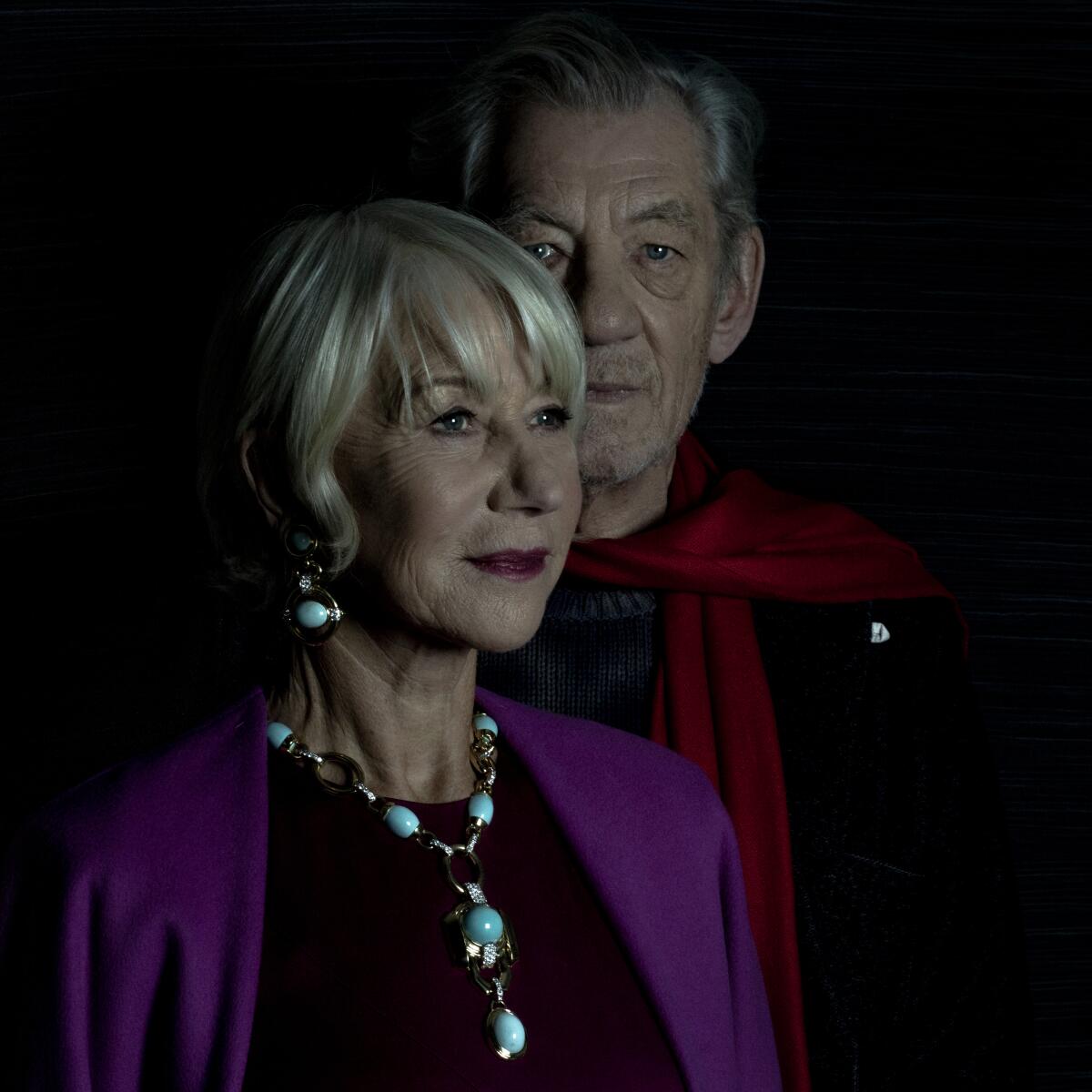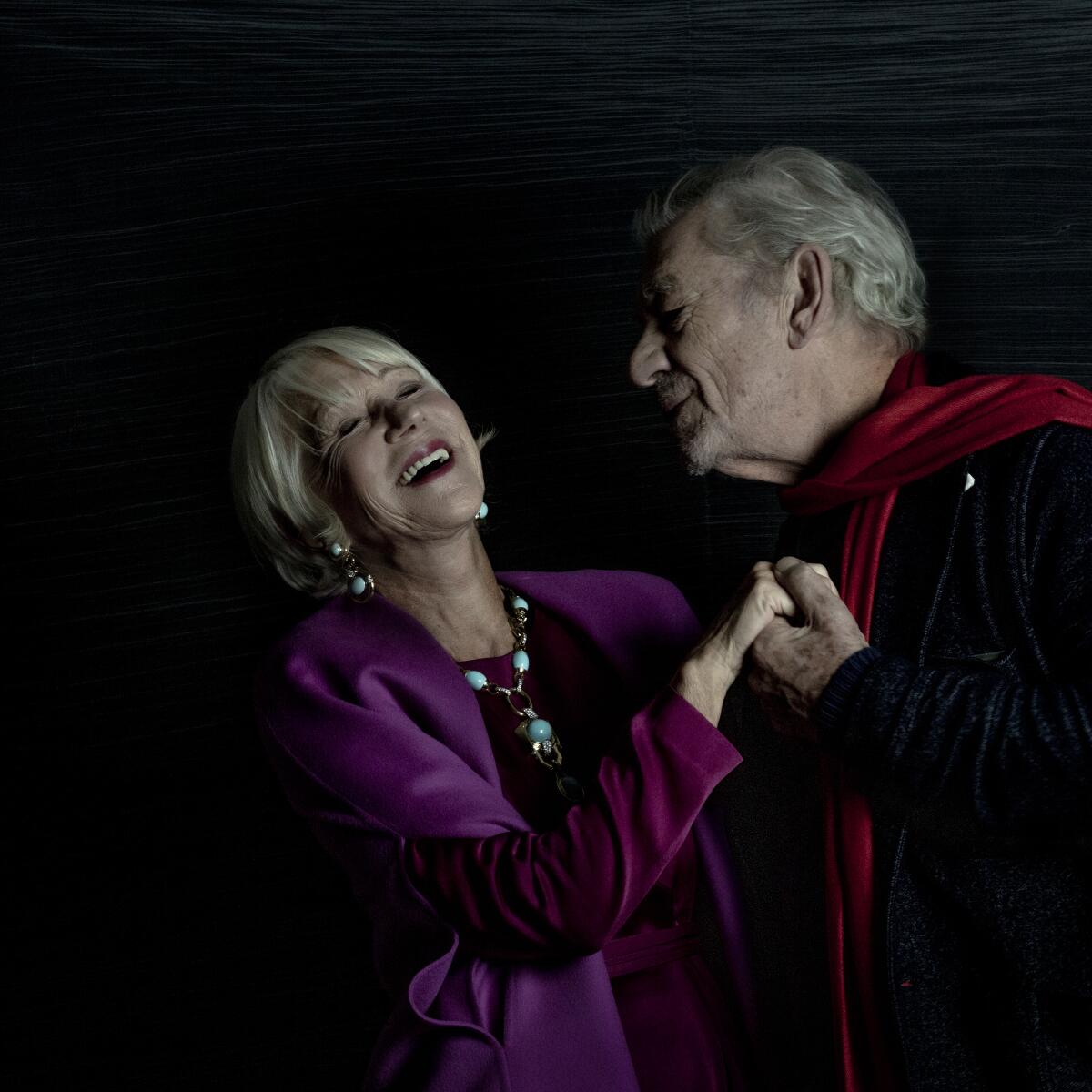How ‘The Good Liar’ brought Helen Mirren and Ian McKellen together on screen for the first time

- Share via
LONDON — In 2001, Ian McKellen and Helen Mirren were rehearsing a production of August Strindberg’s “The Dance of Death” at the Broadhurst Theatre in New York City. A week before the previews opened, the events of Sept. 11 shook the city and its inhabitants to the core. But the play continued on.
“We opened the next week, at a time when you couldn’t move off Manhattan,” says McKellen, sitting with Mirren in the basement room of a restaurant in Hackney where the pair filmed a scene for their new movie “The Good Liar” last fall. “All the bridges were closed. It was extraordinary. You couldn’t move off, you couldn’t come in. Manhattan was a world by itself.”
“And it was an amazing time to be there,” Mirren jumps in. “I’m so honored I was there at that time, honestly. It was so moving and impressive. I thought the New Yorkers were incredible. They just got on it with it in the most amazing way.”
“You might have thought this was a play they would have avoided, but no,” McKellen continues. “We were the latest play on and the locals, having seen all the old hits years ago, came. Those other theaters were empty because the tourists couldn’t come. You could walk into ‘The Producers’ to see Nathan Lane, but you couldn’t get a ticket to see us because it was the locals. They had the blitz spirit. They were going to go on and go to the theater in New York. And we became the center of that need.”
That production of “The Dance of Death,” surprisingly, marked the first time the British actors officially met. While both were aware of each other’s career, McKellen, 80, and Mirren, 74, never had an opportunity to work together before the play (“I’m sure if I had been straight I would have been standing in line,” McKellen quips of his costar’s popularity). And it’s only now, in Bill Condon’s thriller “The Good Liar,” that the actors have teamed for a film.
“Peter Hall, the great theater director, used to say that all members of the English Actors Equity are part of the same company and they could work well together because there were shared values and shared experiences, even though they’d never met,” McKellen says, speaking a year later at the Corinthia Hotel in London ahead of the film’s release. “So when you work with people you don’t know but you’ve seen from afar, it’s a bit like coming home even though you’ve only just arrived.”
“Doing that play, which is very much a two-hander and being in New York at that time was a very bonding experience,” Mirren adds. “Apart from the fact that obviously we come from the same tradition and we’ve followed each other all of our lives, I do think that shared experience meant that when we came back together on this movie there was a whole world of understanding.”
“The Good Liar,” adapted from Nicholas Searle’s 2015 novel of the same name, tells the story of an aging con man named Roy Courtnay (McKellen) who conspires to steal the fortune of a recent widow, Betty (Mirren). Everything is not as it seems in the story, which unfolds slowly to a surprising climax.
That ending was what convinced Condon the novel would make for a good film after producer Greg Yolen suggested the director read the book, which he did in a single flight. The pair quickly looked into the rights, and New Line, who had already optioned the novel, brought Condon onboard. They tapped Jeffrey Hatcher, the screenwriter behind McKellen and Condon’s last collaboration, “Mr. Holmes,” to reimagine the story for the screen.
“From a genre point of view it’s a wonderful twisty, turny crime thriller in the spirit of Patricia Highsmith or John Le Carre,” Condon notes. “That combined with this incisive character study of a con man and his victim made it really appealing to me.”

The director approached McKellen immediately for Roy (although Searle apparently thought of Michael Caine when writing the character) and was interested in Mirren because he read the character of Betty in her voice.
“You’re reading it and you keep hearing her,” Condon says. “And I think when she read it she said the same thing. There are parts you play that are very different than yourself but this one felt like very much an extension of who she is. There’s a pretty long list of actresses of a certain age, British actresses specifically, who could play that. And then you focus in on what those characteristics are about the character that you need. And then you realize it’s got to be Helen.”
For Mirren, the role was a simple yes, particularly because she was interested in working with McKellen and Condon, who previously collaborated on “Mr. Holmes” and Oscar-winning “Gods and Monsters.”
“Sometimes you read something and it really scares you,” Mirren says. “You think, ‘I don’t know if I’m right for this.’ And often you do it for that very reason, because it’s going to be a challenge. This one I didn’t feel like that. I’m not saying it wasn’t a challenge — it always is — but I thought, ‘Oh, yeah, that role plays to my strengths. I can see that working.’ You’re not fighting against who you are naturally. The whole fun of the movie is finding those different levels and stories that the characters have.”
To say much about the story would spoil the unexpected unfurling of the plot. While the novel flashes back over several timelines, the film is told largely in present day and revealed as a two-hander, giving both characters equal weight in the narrative.

For all its twists, it’s an intimate movie about human interaction, one that relies on its actors’ to pile on layers of deception that leave the audience guessing until the very end. In that way, it’s a slightly unusual film coming from a major Hollywood studio, especially in a year of sequels and action-led blockbusters, and it’s also the rare movie that tells the story of older characters.
“It’s still surprising that we got to make this movie,” Condon reflects. “It was sort of like, ‘Wow, they’re doing it!’ It’s a tribute to New Line and Warner Bros. that they decided to make a lot of these grown-up movies. But, yeah, it’s hard. It’s a movie with two older leads, and it’s not about mortality.”
“Normally in this sort of a story it would be characters in their mid-30s or something,” Mirren says with a laugh. “The story is absolutely about these characters and nobody else — they’re not peripheral in any way to the central thrust of this extraordinary plot.”
“Within the scheme of things they’re very plausible characters,” McKellen adds. “They have long histories. I suppose all one’s life is playing characters of the appropriate age, but here were are in our mellow years playing two people with real histories.”
More to Read
Only good movies
Get the Indie Focus newsletter, Mark Olsen's weekly guide to the world of cinema.
You may occasionally receive promotional content from the Los Angeles Times.










